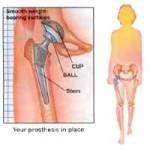 According to HealthDay News, patients who undergo total hip replacement are at greatly increased risk for stroke in the first few weeks after their surgery, a large new study says.
According to HealthDay News, patients who undergo total hip replacement are at greatly increased risk for stroke in the first few weeks after their surgery, a large new study says.
The findings suggest that elderly people need to weigh the benefits of hip replacement against the risk of stroke, according to the researchers.
The investigators compared more than 66,000 people in Denmark who had total hip replacement to nearly 200,000 people who did not have the procedure. The average age of the people in the study was 72. Most were white and female.
The hip replacement patients had a 4.4-fold increased risk of hemorrhagic stroke in the two weeks after surgery, compared to people in the general population. They also had a nearly 4.7-fold increased risk of ischemic stroke, during that time, the study authors found.
According to the study, the risk of ischemic stroke stayed higher for six weeks after hip replacement and the risk for hemorrhagic stroke stayed higher for 12 weeks.
A hemorrhagic stroke is brought on by bleeding in the brain, while an ischemic stroke is brought on by artery blockage.
Frank de Vries, Ph.D., Pharm.D., the study’s lead author and assistant professor of pharmacoepidemiology at Utrecht University in the Netherlands, says, “This is the first study to evaluate the risk of stroke in patients undergoing total hip replacement compared to people in the general population who did not undergo the surgery, but were matched for age, sex and geographical region.”
The team of researchers looked at the timing of strokes during the first two weeks following total hip replacement surgery; in two to six weeks; six to twelve weeks, three to six months; and six to twelve months.
For the first 12 weeks following surgery, the risk for hemorrhagic stroke remained high, while the risk of ischemic stroke was also high for the first six weeks after surgery.
Frank de Vries said, “Up to one year following surgery, there is diminishing risk of stroke after six to 12 weeks. At one year, the stroke risk is comparable to those who did not undergo surgery.”
The risk of stroke declined after that time and returned to normal after one year, according to de Vries.
The researchers also found that taking aspirin lowered hip replacement patients’ risk of stroke by as much as 70 percent. Other medications had no effect.
Each year, about 1 million hip replacements are performed worldwide, including about 300,000 in the United States. The researchers said it was important to assess the risk of stroke in the weeks after hip replacement surgery.
“There is an increasing tendency to decrease the length of hospital stay because of improved therapy and because of strategies to reduce costs and mobilize patients as soon as possible,” de Vries said in a journal news release. “It makes sense to evaluate the risk of stroke two weeks after surgery,” he concluded.
Previous studies have told us that discharging a patiently safely within 2 to 3 days after surgery reduces hospital costs and improves patient satisfaction. Patients normally begin therapy one day post surgery and stop pain medicine as well.
The research team plans to further their examination of stroke risk after total hip replacement surgery in different populations.
The study was published online Nov. 6 in the journal Stroke.
